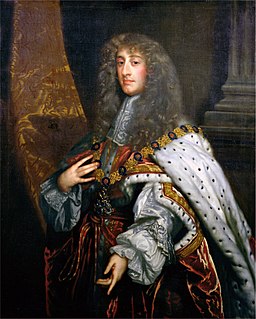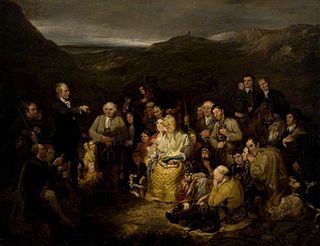
The Glorious Revolution of November 1688, also known as the Glorieuze Overtocht or Glorious Crossing by the Dutch, was the deposition of James II and VII, king of England, Scotland and Ireland and replacement by his daughter Mary II and her husband, William III of Orange, stadtholder and de facto ruler of the Dutch Republic. A term first used by John Hampden in late 1689, historian Jeremy Black suggests it can be seen as both the last successful invasion of England and also an internal coup.

The Bill of Rights 1689, also known as the Bill of Rights 1688, is a landmark Act in the constitutional law of England that sets out certain basic civil rights and clarifies who would be next to inherit the Crown. It received the Royal Assent on 16 December 1689 and is a restatement in statutory form of the Declaration of Right presented by the Convention Parliament to William III and Mary II in February 1689, inviting them to become joint sovereigns of England. The Bill of Rights lays down limits on the powers of the monarch and sets out the rights of Parliament, including the requirement for regular parliaments, free elections, and freedom of speech in Parliament. It sets out certain rights of individuals including the prohibition of cruel and unusual punishment and confirmed that "Protestants may have arms for their defence suitable to their conditions and as allowed by law". It also includes no right of taxation without Parliament’s agreement. Furthermore, the Bill of Rights described and condemned several misdeeds of James II of England.

The Restoration of the Stuart monarchy in the kingdoms of England, Scotland and Ireland took place in 1660 when King Charles II returned from exile in Europe. The preceding period of the Protectorate and the civil wars came to be known as the Interregnum (1649–1660).

George Jeffreys, 1st Baron Jeffreys, PC, also known as "the Hanging Judge", was a Welsh judge. He became notable during the reign of King James II, rising to the position of Lord Chancellor. His conduct as a judge was to enforce royal policy, resulting in an historical reputation for severity and bias.

John Somers, 1st Baron Somers, was an English Whig jurist and statesman. Somers first came to national attention in the trial of the Seven Bishops where he was on their defence counsel. He published tracts on political topics such as the succession to the crown, where he elaborated his Whig principles in support of the Exclusionists. He played a leading part in shaping the Revolution settlement. He was Lord High Chancellor of England under King William III and was a chief architect of the union between England and Scotland achieved in 1707 and the Protestant succession achieved in 1714. He was a leading Whig during the twenty-five years after 1688; with four colleagues he formed the Whig Junto.
Lady Alice Lisle, commonly known as Alicia Lisle or Dame Alice Lyle, was a landed lady of the English county of Hampshire, who was executed for harbouring fugitives after the defeat of the Monmouth Rebellion at the Battle of Sedgemoor. While she seems to have leaned to Royalism, she combined this with a decided sympathy for religious dissent. She is known to history as Lady Lisle although she has no claim to the title; her husband was a member of the "Other House" created by Oliver Cromwell and "titles" deriving from that fact were often used after the Restoration.

The Wars of the Three Kingdoms, sometimes known as the British Civil Wars, were an intertwined series of conflicts that took place between 1639 and 1653 in the Kingdoms of England, Scotland and Ireland – separate kingdoms which had the same king, Charles I. The wars were fought mainly over issues of governance and religion, and included rebellions, civil wars and invasions. The English Civil War has become the best-known of these conflicts. It ended with the English parliamentarian army defeating all other belligerents, the execution of the King, the abolition of the monarchy, and the founding of the Commonwealth of England; a unitary republic which controlled the British Isles until 1660.

The Seven Bishops were members of the Church of England tried and acquitted for seditious libel in June 1688.

The Parliament of Scotland was the legislature of the Kingdom of Scotland. The parliament, like other such institutions, evolved during the Middle Ages from the king's council of bishops and earls. It is first identifiable as a parliament in 1235, during the reign of Alexander II, when it was described as a "colloquium" and already possessed a political and judicial role. By the early 14th century, the attendance of knights and freeholders had become important, and from 1326 commissioners from the burghs attended. Consisting of the "three estates" of clergy, nobility and the burghs sitting in a single chamber, the parliament gave consent for the raising of taxation and played an important role in the administration of justice, foreign policy, war, and all manner of other legislation. Parliamentary business was also carried out by "sister" institutions, such as General Councils or Convention of Estates. These could carry out much business also dealt with by parliament – taxation, legislation and policy-making – but lacked the ultimate authority of a full parliament.
Samuel Parker was an English churchman, of strong Erastian views and a fierce opponent of Dissenters. His political position is often compared with that of Thomas Hobbes, but there are also clear differences; he was also called in his time a Latitudinarian, but this is not something on which modern scholars are agreed. During the reign of King James II he served as Bishop of Oxford, and was considered by James to be a moderate in his attitude to Catholics.

The Killing Time was a period of conflict in Scottish history between the Presbyterian Covenanter movement, based largely in the south west of the country, and the government forces of Kings Charles II and James VII. The period, roughly from 1679 to the Glorious Revolution of 1688, was subsequently called The Killing Time by Robert Wodrow in his The History of the Sufferings of the Church of Scotland from the Restoration to the Revolution, published in 1721–22. It is an important episode in the martyrology of the Church of Scotland.

Sir William Williams, 1st Baronet was a Welsh lawyer and politician. He served as a Member of Parliament for Chester and later Beaumaris, and was appointed Speaker for two English Parliaments during the reign of Charles II. He later served as Solicitor General during the reign of James II. Williams had a bitter personal and professional rivalry with Judge Jeffreys.

The Declaration of Right, or Declaration of Rights, is a document produced by the English Parliament, following the 1688 Glorious Revolution. It set outs the wrongs committed by the exiled James II, the rights of English citizens, and the obligation of their monarch.

James II and VII was King of England and Ireland as James II, and King of Scotland as James VII, from 6 February 1685 until he was deposed in the Glorious Revolution of 1688. He was the last Catholic monarch of England, Scotland, and Ireland; his reign is now remembered primarily for struggles over religious tolerance. However, it also involved the principles of absolutism and divine right of kings, and his deposition ended a century of political and civil strife by confirming the primacy of Parliament over the Crown.
Events from the year 1685 in England. This year sees a change of monarch.

A conventicle originally signified no more than an assembly, and was frequently used by ancient writers for a church. At a semantic level conventicle is only a good Latinized synonym of the Greek word church, and points to Jesus' promise in Matthew 18:20, "Where two or three are met together in my name." It came to be applied specifically to meetings of religious associations, particularly private and secret gatherings for worship. Later it became a term of deprecation or reproach, implying that those of whom it was used were in opposition to the ruling ecclesiastical authorities; for example, it was applied to a cabal of mutinous monks in a convent or monastery. Ultimately it came to mean religious meetings of dissenters from an Established Church, held in places that were not recognized as specially intended for public worship or for the exercise of religious functions. It implied that a condition of affairs obtained in which the State made a distinction between a form or forms of religion whose practice and propagation were authorized by statute, and such as were expressly prohibited by enactment. This usage has received legal sanction in Britain.

Theophilus Hastings, 7th Earl of Huntingdon was a 17th-century English politician and Jacobite. One of the few non-Catholics to remain loyal to James II of England after November 1688, on the rare occasions he is mentioned by historians, he is described as a 'facile instrument of the Stuarts,' a 'turncoat' or 'outright renegade.'

Laudianism was an early seventeenth-century reform movement within the Church of England, promulgated by Archbishop William Laud and his supporters. It rejected the predestination upheld by the previously dominant Calvinism in favour of free will, and hence the possibility of salvation for all men. It is probably best known for its impact on the Anglican High Church movement and its emphasis on liturgical ceremony and clerical hierarchy. Laudianism was the culmination of the move towards Arminianism in the Church of England, but was neither purely theological in nature, nor restricted to the English church.

The Loyal Parliament was the only Parliament of England of King James II, in theory continuing from May 1685 to July 1687, but in practice sitting during 1685 only. It gained its name because at the outset most of its members were loyal to the new king. The Whigs, who had previously resisted James's inheriting the throne, were outnumbered both in the Commons and in the Lords.
Sir Richard Stephens (c.1630–1692) was an Irish barrister, politician and judge of the seventeenth century. He was a highly successful lawyer, who made a considerable fortune, but his political career was hampered by his unorthodox religious and political views. He became Serjeant-at-law (Ireland) under King Charles II, but was dismissed from office after only two years. He was in political disgrace during the following reign. After the Glorious Revolution he was appointed to the Irish High Court bench, but he died only two years later.















